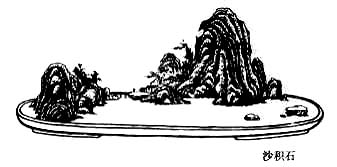論
語
Lun Yu 
 – The Analects of Confucius
– The Analects of Confucius
The Master discusses with his disciples and unveil his preoccupations with society. Tr. Legge (en), Lau (en) and Couvreur (fr).
Lunyu XIII. 3. (320)
The supreme importance of names being correct.
1. Tsze-lû said, "The ruler of Wei has been waiting for you, in order with you to administer the government. What will you consider the first thing to be done?"
2. The Master replied, "What is necessary is to rectify names."
3. "So! indeed!" said Tsze-lû. "You are wide of the mark! Why must there be such rectification?"
4. The Master said, "How uncultivated you are, Yû! A superior man, in regard to what he does not know, shows a cautious reserve.
5. "If names be not correct, language is not in accordance with the truth of things. If language be not in accordance with the truth of things, affairs cannot be carried on to success.
6. "When affairs cannot be carried on to success, proprieties and music will not flourish. When proprieties and music do not flourish, punishments will not be properly awarded. When punishments are not properly awarded, the people do not know how to move hand or foot.
7. "Therefore a superior man considers it necessary that the names he uses may be spoken appropriately, and also that what he speaks may be carried out appropriately. What the superior man requires is just that in his words there may be nothing incorrect."
Legge XIII.3.
Tzu-lu said, 'If the Lord of Wei left the administration (cheng) of his state to you, what would you put first?' The Master said, 'If something has to be put first, it is, perhaps, the rectification (cheng) of names.' Tzu-lu said, 'Is that so? What a roundabout way you take! Why bring rectification in at all?' The Master said, 'Yu, how boorish you are. Where a gentleman is ignorant, one would expect him not to offer any opinion. When names are not correct, what is said will not sound reasonable; when what is said does not sound reasonable, affairs will not culminate in success; when affairs do not culminate in success, rites and music will not flourish; when rites and music do not flourish, punishments will not fit the crimes; when punishments do not fit the crimes, the common people will not know where to put hand and foot. Thus when the gentleman names something, the name is sure to be usable in speech, and when he says something this is sure to be practicable. The thing about the gentleman is that he is anything but casual where speech is concerned.'
Lau [13:3]
Tzeu lou dit : « Si le prince de Wei vous attendait pour régler avec vous les affaires publiques, à quoi donneriez-vous votre premier soin ? – A rendre à chaque chose son vrai nom », répondit le Maître. « Vraiment ? répliqua Tzeu lou. Maître, vous vous égarez loin du but. A quoi bon cette rectification des noms ? » Le Maître répondit : « Que tu es rustre ! Un homme honorable se garde de se prononcer sur ce qu'il ignore.
Si les noms ne sont pas ajustés, le langage n'est pas adéquat. Si le langage n'est pas adéquat, les choses ne peuvent être menées à bien. Si les choses ne peuvent être menées à bien, les bienséances et l'harmonie ne s'épanouissent guère. Les bienséances et l'harmonie ne s'épanouissant guère, les supplices et les autres châtiments ne sont pas justes. Les supplices et les autres châtiments n'étant plus justes, le peuple ne sait plus sur quel pied danser. Tout ce que l'homme honorable conçoit, il peut l'énoncer, et l'énonçant il peut le faire. L'homme honorable ne laisse rien à la légère. » K'ouai kouei, héritier présomptif de Ling, prince de Wei, honteux de la conduite déréglée et licencieuse de sa mère Nan tzeu, voulut la tuer. N'ayant pas réussi, il s'enfuit. Le prince Ling voulut nommer Ing son héritier. Ing refusa. A la mort du prince Ling, sa femme Nan tzeu nomma Ing héritier de la principauté. Ing refusa de nouveau. Elle donna la principauté à Tche, fils de K'ouai kouei, afin d'opposer le fils au père. Ainsi, K'ouai kouei, en voulant tuer sa mère, avait encouru la disgrâce de son père ; et Tche, en prenant l'autorité princière, faisait opposition à son père K'ouai kouei. Tous deux étaient comme des hommes qui n'auraient pas eu de père. Evidemment, ils étaient indignes de régner. Si Confucius avait été chargé du gouvernement, il aurait commencé par corriger les appellations (celui-là seul aurait porté le nom de père ou de fils qui en aurait rempli les devoirs). Il aurait fait connaître au chef de l'empire l'origine et tous les détails de cette affaire ; il l'aurait prié d'ordonner à tous les seigneurs de la contrée de reconnaître Ing pour héritier de la principauté. Dès lors, la loi des relations entre les hommes aurait été juste. Les principes célestes auraient été observés, les appellations correctes, le langage adéquat, et les affaires menées à bien. (Tchou Hsi)
Couvreur XIII.3.

The Analects of Confucius – Lun Yu XIII. 3. (320) – Chinese on/off – Français/English
Alias the Lunyu, the Lun Yü, the Analects, les Entretiens du maître avec ses disciples.
The Book of Odes, The Analects, Great Learning, Doctrine of the Mean, Three-characters book, The Book of Changes, The Way and its Power, 300 Tang Poems, The Art of War, Thirty-Six Strategies
Welcome, help, notes, introduction, table.
Index – Contact – Top























